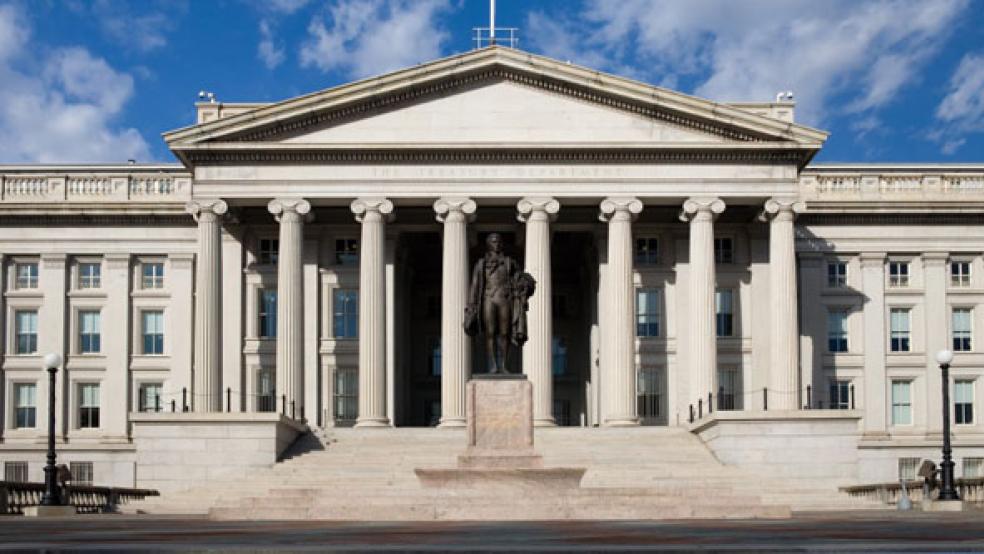With the virtual certainty that Treasury Secretary Timothy Geithner will be leaving his post shortly after the new year, there is much speculation about who might replace him. At this point, I think it makes more sense to focus on the sorts of qualities the next secretary should have, rather than speculating on personalities just because they are being bandied about in the media.
The first point is that the Treasury Department historically has been the premier economic policymaking agency of government. Dating back to Alexander Hamilton, the Treasury secretary has been the president’s principal economic adviser.
I was working at Treasury in 1989, the 200th anniversary of its establishment. President George H.W. Bush walked over for a little celebration – the Treasury building is only a few feet from the White House – and talked about the department’s importance throughout the history of the United States. I still remember the laughter of the crowd when Bush said that Hamilton was confirmed in his position the same day his nomination was sent to the Senate.
Over the years, a great many governmental functions were originally entrusted to Treasury that have since been spun off into other departments. Most recently, the Bureau of Alcohol, Tobacco and Firearms was transferred to the Justice Department in 2003. That same year, the Secret Service and the Customs Service became part of the newly-created Department of Homeland Security.
As a consequence, the Treasury is a much smaller department that is less in need of a manager; most of its principal bureaus, such as the Bureau of the Public Debt and the Financial Management Service, pretty much run themselves. The secretary’s main responsibilities now involve international economic policy, financial policy, tax policy and general economic policy.
The important thing to note is the word “policy” in each of these responsibilities. It is the secretary’s primary duty to provide direction to the policymaking offices within Treasury, advice to the president, and be an effective spokesman for the administration’s policy within its areas of oversight.
The qualities one would want in a good Treasury secretary obviously vary with the nature of the economic problems the nation is facing. It also helps a great deal if he has a close personal relationship with the president. I have always liked this discussion of the strengths of Henry Morgenthau, who served as secretary throughout most of Franklin Roosevelt’s long administration, by the historian John Morton Blum:
“He [Morgenthau] chose good people, used them effectively, ran tight organizations, got results, and kept his mouth shut…Above all, his highest ambition was plainly not for himself. It was to serve Franklin Roosevelt.”
I thought much the same could be said of Nicholas Brady, who served George H.W. Bush and whom I served for four years.
I was reminded of Brady’s virtues just this week at a conference sponsored by George Mason University and the Bipartisan Policy Center on the 1990 budget deal. That deal is now remembered mainly because President Bush broke his no-new-taxes pledge, which contributed heavily to his defeat in 1992. I believe it was an act of statesmanship.
I wasn’t privy to Secretary Brady’s thinking, but I am certain that President Bush would not have agreed to a tax rise unless his Treasury secretary supported the idea. At the conference, Brady’s principal tax adviser, Columbia University law professor Michael Graetz, said that very considerable work had been done on various revenue-raising options to be presented to budget negotiators at Andrews Air Force base in the summer of 1990.
The point I am getting at is that tax policy has historically been one of the Treasury secretary’s primary areas of focus. But that has changed over the last 20 years, as various secretaries have taken more interest in banking, finance and international economic issues. During both the Bill Clinton and George W. Bush administrations, Treasury ceased to be the lead agency on tax policy. The White House tended to signal general ideas about tax policy to Congress and then let it work its will.
An important consequences of this laissez-faire policy has been that the tax code has become unbelievably screwed-up as new tax provisions became layered on old ones, the interactions between old and new provisions were ignored, the administrative aspects of tax policy took a back seat to scoring cheap political points, and Treasury’s recommendations for legislative fixes to various tax problems were routinely ignored by Congress year after year.
I would emphasize that this is a bipartisan problem and has been a problem under both Republican and Democratic control of Congress. But the price has been heavy, which is why there is so much pressure to enact meaningful tax reform.
In Barack Obama’s second term, I believe that tax policy will be the Treasury secretary’s main concern. The president has a strong desire to raise tax rates on the rich and all serious budget experts know that higher revenues are essential to solving our long-term fiscal problem. And, with luck, tax reform may also be on the agenda.
For these reasons, I hope President Obama looks beyond the usual Wall Street banker-types when choosing a replacement for Mr. Geithner. I think he needs a tax guy; someone steeped in the intricacies of the tax code with long experience in tax policy.
I am reluctant to name the names of people I would recommend for fear of destroying whatever chance they might have. Suffice it to say, there are a number of people in academia and in the tax practitioner field with the requisite experience and qualifications. I hope President Obama’s staff at least talks to them and solicits their ideas.






